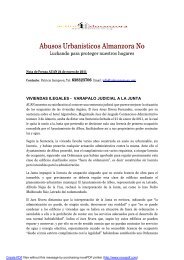European Property Rights and Wrongs - Diana Wallis MEP
European Property Rights and Wrongs - Diana Wallis MEP
European Property Rights and Wrongs - Diana Wallis MEP
You also want an ePaper? Increase the reach of your titles
YUMPU automatically turns print PDFs into web optimized ePapers that Google loves.
transactions <strong>and</strong> controlling unfair commercial practices, almost too successfully<br />
since EU intervention has killed much of the market, locking existing purchasers<br />
into unsaleable timeshares.<br />
Aspirations have moved on from participation in a timeshare to the ownership<br />
of a second home. This trend was stimulated by the increase in foreign holidays,<br />
but has been boosted by the growth of internet marketing which makes it<br />
very much easier to buy property in another country, but also much easier to buy<br />
without the necessary local knowledge. Traditionally one needed to decide where<br />
to buy, but the internet st<strong>and</strong>s this logic on its head. Most property research is<br />
now done on the internet <strong>and</strong>, in the jargon of tv property shows, one merely has<br />
to decide what boxes to tick <strong>and</strong> then click the search button. <strong>Property</strong> portals<br />
usually have conventional estate agents behind them, <strong>and</strong> it has not yet become<br />
general to miss the professional marketing stage completely. Nevertheless modern<br />
marketing is creating a cross-border dimension. The internet facilitates a connection<br />
between a buyer, a portal operator, an agent, a seller, <strong>and</strong> some l<strong>and</strong>, <strong>and</strong><br />
each of these elements might be dispersed in separate countries.<br />
Europe has a potential st<strong>and</strong>ing first in relation to the marketing, secondly<br />
in consumer transactions where a second home is bought from a developer <strong>and</strong><br />
thirdly in relation to cross-border transactions for example in the payment of the<br />
purchase price across national boundaries. The EU might, for example, introduce<br />
rules that required for the future a formal notice to future buyers of the risk of<br />
incurring infrastructure charges, especially when a consumer buys a new build<br />
apartment direct from the developer. However, market <strong>and</strong> consumer rules do<br />
not provide a means to attack the substantive rules of Spanish property law <strong>and</strong><br />
the rules currently in force would not enable a challenge to a purchase on the<br />
grounds of lack of information.<br />
Notarial services<br />
Whether Europe has a role in purchasing across internal borders depends on<br />
whether the major problem is seen to be dealing successfully with the purchase<br />
of l<strong>and</strong>; or dealing with the administration of a cross-border purchase <strong>and</strong> the<br />
possible market surprise of a foreign buyer.<br />
32<br />
A <strong>European</strong> L<strong>and</strong> Law?



